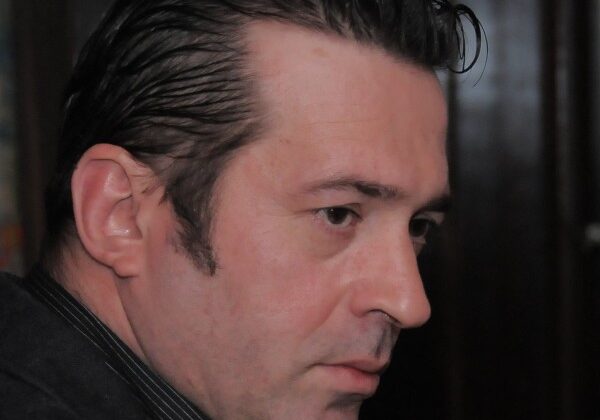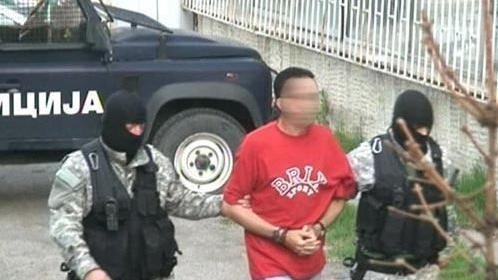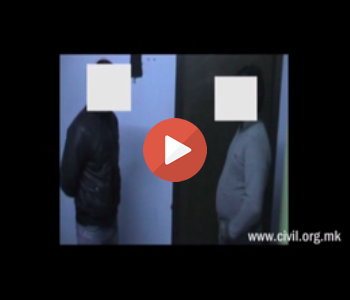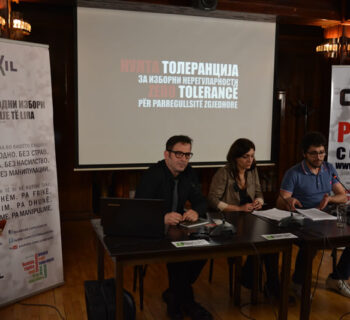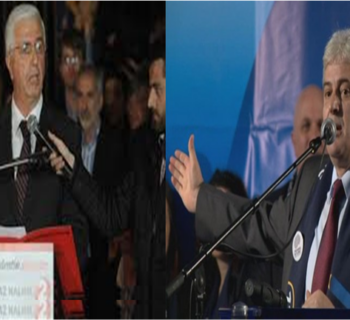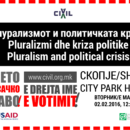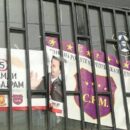The Kezarovski ruling makes a mockery of the Prime Minister’s claim that the courts operate independently of politics in Macedonia.
There is very little to say about the latest display of injustice towards the journalist Tomislav Kezarovski in sentencing him to four-and-a-half years in prison. Why? Because this severe sentence was only to be expected, having in mind that Kezarovski was arrested in May this year, and has been kept in detention ever since.
Xhabir Deralla
 The shockingly irrational act leaves people wordless. And it has been the same for a number of years now. In one case after another, people who dared confront the ruling party have ended up in long periods of detention, with harsh prison sentences. We’ve seen quite a few proceedings on cases of corruption, tax evasion and other financial crimes mounted against people who happened to be on the “wrong” side of power. One such case wiped out the A1 TV station and three daily newspapers that were known for being critical of the government. Such also is the case of the imprisonment of one opposition leader, and several others. It hasn’t stopped at the level of financial crime charges. Several people were arrested for espionage recently. Allegedly, they spied for Greece and Hungary! The most blatant attack against freedom of speech was certainly the arrest of the journalist Tomislav Kezarovski. His arrest has drawn loud reactions from countless people, journalists and organizations from home and abroad. The most relevant institutions have all demanded his release from detention and a fair trial. In a letter of August 29 sent to Prime Minister Nikola Gruevski, the OSCE Representative on Freedom of the Media, Dunja Mijatović, described Kezarovski’s continued detention for another 30 days as unacceptable. “Imprisonment of journalists for their writing is not acceptable in a democratic society. This is the only case in the Western Balkan region where a journalist is held in prison pending trial. I am concerned both by his arrest and excessively lengthy detention, as they negatively impact on media freedom in your country,” Mijatović wrote. The Prime Minister’s answer came two days later. “The principle of the separation of powers does not allow the government to intervene in court decisions, regardless of how much it disagrees with them, no matter how such decisions may harm the country’s image,” he said. “The government, as in all other court cases, is staying out of the case of Tomislav Kezarovski. The government neither sought to impose detention on Mr Kezarovski, nor has it influenced competent judges in deciding the measure,” he added. “Although some structures are trying to politicize this case, even though it can also be used to damage the image of the Republic of Macedonia, our principled government will continue to stay away and will carefully monitor the court hearings in this case, because this is the only correct and possible way of conduct,” Gruevski concluded.
The shockingly irrational act leaves people wordless. And it has been the same for a number of years now. In one case after another, people who dared confront the ruling party have ended up in long periods of detention, with harsh prison sentences. We’ve seen quite a few proceedings on cases of corruption, tax evasion and other financial crimes mounted against people who happened to be on the “wrong” side of power. One such case wiped out the A1 TV station and three daily newspapers that were known for being critical of the government. Such also is the case of the imprisonment of one opposition leader, and several others. It hasn’t stopped at the level of financial crime charges. Several people were arrested for espionage recently. Allegedly, they spied for Greece and Hungary! The most blatant attack against freedom of speech was certainly the arrest of the journalist Tomislav Kezarovski. His arrest has drawn loud reactions from countless people, journalists and organizations from home and abroad. The most relevant institutions have all demanded his release from detention and a fair trial. In a letter of August 29 sent to Prime Minister Nikola Gruevski, the OSCE Representative on Freedom of the Media, Dunja Mijatović, described Kezarovski’s continued detention for another 30 days as unacceptable. “Imprisonment of journalists for their writing is not acceptable in a democratic society. This is the only case in the Western Balkan region where a journalist is held in prison pending trial. I am concerned both by his arrest and excessively lengthy detention, as they negatively impact on media freedom in your country,” Mijatović wrote. The Prime Minister’s answer came two days later. “The principle of the separation of powers does not allow the government to intervene in court decisions, regardless of how much it disagrees with them, no matter how such decisions may harm the country’s image,” he said. “The government, as in all other court cases, is staying out of the case of Tomislav Kezarovski. The government neither sought to impose detention on Mr Kezarovski, nor has it influenced competent judges in deciding the measure,” he added. “Although some structures are trying to politicize this case, even though it can also be used to damage the image of the Republic of Macedonia, our principled government will continue to stay away and will carefully monitor the court hearings in this case, because this is the only correct and possible way of conduct,” Gruevski concluded.
Frank La Rue, UN Special Rapporteur on the promotion and protection of the right to freedom of expression, said: “Kezarovski should be released immediately. Excessive measures such as his prolonged detention only serve to intimidate journalists and deeply hurt the independence of the media. Democracies can never work properly when critical voices are silenced.”
The very few media that remain independent publicized La Rue’s findings, whilst the government controlled media did their best to spin his report and statements on freedom of expression. The Prime Minister’s statement meanwhile is not convincing. It is indisputable that the justice system in Macedonia is corrupted and politicized. The Prime Minister himself admits that, by constantly repeating that the justice system is in the process of fundamental reforms. One does not reform institutions that work well. Moreover, the government is responsible for the proper functioning of the institutions; that is why a justice ministry exists. Violation of laws and depriving people of their basic rights, including access to justice, is notorious in this country. The judiciary is independent, says the PM. But independent from what - from justice? The day of the verdict came. After almost five months of detention this appalling Kafka-like process came to an end. Hopes that the prosecutor and the judge might come to their senses and finally decide to act in accordance with the laws and human rights standards were slim. So it was. Kezarovski was sentenced to four-and-a-half years. Although hopes for justice were low, the final ruling was still shocking. This case, like many others, is senseless. But there probably is a reason for it. It’s if we are being told: “See what we can do, and yet still call it justice and law! You can do nothing about it!”
Justice Minister Blerim Bexheti has manifested maximum obedience since he took up his post. In an interview for Radio Free Europe, he proudly said that detention is not a measure used in excess in Macedonia. “Only 5 per cent of court cases end up with detention,” he said. He didn’t say which court cases, for how long a period, or what the number of cases he is operating with is. He didn’t know these figures? Was he only saying what the ruling party told him to say? Did he want to say it? Was he afraid to tell the truth, or just didn’t care? Questions mount up, unanswered. The pro-government media rushed to explain why Kezarovski was imprisoned and prosecuted in such a manner, pumping up the “crime” and justifying what cannot be justified. By doing so, they only raised more questions. Why did Kezarovski come under such heavy fire? Some of the answers came from his lawyers. “The only reason for jailing Tomislav Kezarovski was his investigation of the death of the owner of the Fokus newspaper Nikola Mladenov,” the lawyer Andrea Radinovski said, conveying Kezarovski’s own standpoint right after the verdict was announced. “The prison sentence is based on proceedings without evidence,” lawyer Zvonko Radinovski added. Analysts and human rights activists agreed that the only real “crime” of Kezarovski was that he dared to write about the transgressions of government institutions. I believe that some readers may not be entirely well informed about the Kezarovski case. I could see that from some of the Facebook statuses and comments in the last 48 hours. I don’t blame them, having in mind the state of the media in the country. Here are a few lines about it. Kezarovski, a journalist of the daily Nova Makedonija, was originally charged with revealing the identity
of a protected witness in an article published in 2008. The “protected witness” did not even have that status at the time. Moreover, the same “protected witness” last February confessed that he gave false testimony under police pressure. Before the special police arrested him on May 28, Kezarovski was investigating the circumstances of Fokus publisher and editor Mladenov who died in a mysterious car accident in March. While writing these lines, I feel uncomfortable, to say the least. I feel for Kezarovski, whom I might not know personally, but have felt close to in the last several months. I feel for his family, who have suffered immensely. I feel for all people imprisoned in the last few years, for whose verdicts the government, judges and media megaphones have provided no real justification. Finally, I feel for my own friends, colleagues and family who increasingly fear for my own wellbeing, knowing what I do, say and write about day in, day out. I remember, in the last years of the Communist regime, at the end of the Eighties, when I started as a journalist on the Mlad Borec magazine, under Nikola Mladenov and Saso Ordanoski. Our magazine grew into a dissident media house for the promotion of free speech; it became known as the carrier of the “Macedonian spring”. Back in those days, the one-party monolithic system could lock one up for good. Still, the atmosphere in society then was not as grim as it seems today. We were under pressure, of course. But, somehow, we knew that we were not going to be imprisoned for what we were writing. I used to give poetry performances in coffee bars, politically engaged ones, too. I was taken to a police station once, beaten up and released some hours later. But, I somehow felt safe from prison. I can’t say that now. As a human rights activist, I had the sad opportunity to learn about the detention centre in Shutka and the other prison facilities in Macedonia. I visited 13 of them. I know that conditions in Shutka are utterly inhumane and that the treatment there is below any standard adopted by national or international laws and conventions. Once you get there, you will never be the same again. It is not only the buildings, it is the people who run the prison system. When I write this, have to say it again, I am afraid. Yet, I can’t help but struggle with my fear, because I strongly believe in justice and freedom. And I can’t be free if an innocent person is imprisoned. Therefore, I will repeat what my colleagues at Civil and I have said in public on a number of occasions in the last months and on the day of the verdict. “The prison sentence of Kezarovski is shameful, brutal and shocking and is a grave violation of human rights, freedom of speech and the independence of the media in the country. This case was meant to frighten and to intimidate Kezarovski and other Macedonian journalists and is a clear violation of the freedom of expression. […] Free Kezarovski immediately and compensate for all suffering he and his family experienced since his arrest!”
Article source at: http://www.balkaninsight.com
This post is also available in: Macedonian
 Македонски
Македонски Shqip
Shqip English
English
